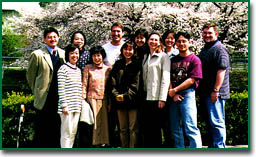 |
The same can now be said for our fledgling Brain Science Institute. The brain begins working long before it is finished, laying out circuits that are its best guess about what is required. The BSI is currently in this stage of development: buildings sprout up, lab benches are set in place, and new teams are hired. Through the insightful wisdom of Dr. Masao Ito Director of the BSI, and the Steering Committees, we are like the newborn's brain whose innate ontogeny has run its course. And what a spectacular scaffold it is! Now it is up to the "activity" of its inhabitants, driven by a flood of sensory experiences, to take this rough blueprint and progressively improve it.
The success of an institution is determined only in part by physical hardware, and mostly by its "software". New ideas and innovations arising from creative discussions and novel collaborations will define the heart and soul of BSI. To this end, we need opportunities for interaction and exposure to fresh perspectives. Afternoon teas at Harvard or beer hours following student-faculty journal club at UCSF served this purpose. At our annual BSI Retreat, Invited Seminar Series, lunchtime journal clubs, or Summer School we hope to encourage the same.
We are striving to establish user-friendly core facilities for radioisotopes, animal care, and advanced technologies that can be profitably shared among laboratories. For all of this to be successful, we recall another implication of brain development: very young children should rarely be left in the care of others. It is important that BSI researchers, rather than committees or the Brain Science Planning Office, find the time to nurture and guide our growing scientific community.
Only during the first three years of life does a profusion of connections lend the developing brain exceptional flexibility and resilience. Whether a child's mind is wired for great scientific prowess or a lifetime of idleness depends on the patterns etched by repeated experience in those critical early years. Many adults still manage to learn new languages, but usually only after great struggle. For the sake of BSI's promising future, now is the time for those accustomed to the traditional hierarchy of universities to learn a new "language" of lateral communication. We must remove any walls that confine us to individual laboratories in favor of common areas for discussion. Post-docs should be encouraged to interact freely with each other, while BSI is transformed into a more attractive place for foreigners to live and work in Japan. In a few short years, our developmental critical period will pass. As we take our first tentative steps, we look to the global research community to stimulate us.
|
 |
|
In a land where melons cost more than cellular phones, RIKEN BSI represents a fresh chance to get our priorities straight. The uniquely Japanese vision of long-term research investment has fallen upon Neuroscience, offering an opportunity unprecedented anywhere in the world. To realize the potential for greatness encoded in the genes of the Frontier Research Program, our activity-dependent development must now establish the right conditions for productive research twenty years into the future. Only then can we hope to make a lasting contribution in the quest to understand, protect, and create the brain.
|

Members of the Lab.
for Neuronal Circuit Development
|
 |
 |
|
|
|






